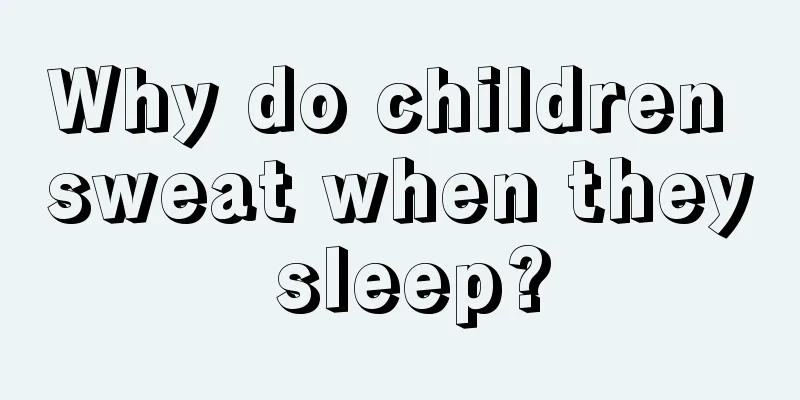Why do children sweat when they sleep?

|
Why do children sweat while sleeping? Many parents will encounter this problem. Children sweat a lot when they sleep, and their hair and clothes are wet. Parents will feel distressed and worried when they see it, fearing that their children have some disease. Therefore, parents need to learn more about it. In fact, there are many reasons why children sweat while sleeping. Parents should make correct and careful judgments and seek medical attention in time when necessary. Some children sweat while sleeping because they lack certain trace elements in their bodies, such as calcium. Therefore, the children should have a trace element check and supplement the necessary trace elements in time. Sometimes careless parents are always afraid that their children will be cold, so they cover their children with too thick quilts without noticing. However, some sweating is pathological, which should alert parents. Here are some symptoms and methods related to children sweating while sleeping. Physiological sweating and its solutions 1For normal children, parents do not need to worry even if they sweat too much, because children's sweat glands are more developed. The secretion of sweat glands is controlled by the autonomic nervous system (vagus nerve). After a child falls asleep, the vagus nerve becomes excited, causing excessive sweating. Sweating usually occurs mostly on the head and face, but it will subside within one or two hours after sleeping. At this time, you can use a dry towel to wipe off the sweat in time; change underwear frequently to prevent catching a cold due to excessive sweating; let your child take a bath frequently, and expose the bedding or sleeping bags to the sun frequently to keep them dry, and sterilize them at the same time. 2 In infancy and childhood, due to the active metabolism and active children, some of them cannot rest even after going to bed at night, so they may sweat on their heads after falling asleep. The so-called physiological hyperhidrosis refers to sweating during sleep when the child is well-developed, healthy, and has no disease. Parents are often accustomed to deciding the best environmental temperature for their children based on their own subjective feelings, and like to cover their babies with more blankets and keep them tightly covered. Because children's brain and nervous system are not yet fully developed and they are in the growth and development period, their body metabolism is very active. Coupled with the stimulation of overheating, they can only regulate normal body temperature by sweating to evaporate the heat in the body. In addition, drinking milk, malted milk or eating chocolate before going to bed can also cause sweating in children. Some parents give their children milk, malted milk, etc. before they go to sleep. After the child falls asleep, the body produces a large amount of heat, which is mainly dissipated through sweating through the skin. In addition, too high room temperature or excessive warmth can also cause children to sweat while sleeping, which are all physiological sweating. Pathological sweating and its solution 1 Pathological sweating occurs when the child is in a quiet state, such as sweating caused by rickets, which manifests as obvious sweating on the child's head in the first half of the night after falling asleep. Because the pillow is irritated by sweat, babies often shake their heads and rub against the pillow when they sleep, resulting in sparse hair and loss of hair on the pillow, forming typical annular hair loss on the pillow, which is medically known as "occipital baldness". It is an early manifestation of rickets in infants. As long as vitamin D and calcium are supplemented in time, rickets can be controlled and sweating will stop by itself. 2 If a child sweats not only in the first half of the night but also in the second half of the night and before dawn, it is mostly a sign of illness, the most common of which is tuberculosis. Tuberculosis also has other symptoms, such as low fever, fatigue, loss of appetite, flushed cheeks, etc. Children with tuberculosis tend to sweat easily during daytime activities, which is called spontaneous sweating, and sweating at night is called night sweats. If you suspect your child is infected with tuberculosis, a lung X-ray or a tuberculin test should be done for timely diagnosis and treatment. 3 Heart disease, diabetes (hypoglycemia), tuberculosis or breathing problems during sleep, because the internal pressure (lesions) of the body causes the sympathetic nerves to be in a state of tension all the time, may also cause "night sweats" or "cold sweats on hands and feet". This is a long-term symptom. If parents are worried, they can take the baby to a pediatric clinic or hospital for examination, listen to the heartbeat for abnormalities, feel the belly for lumps (tumors), check whether the upper respiratory tract is unobstructed or whether the baby has allergies, etc., to eliminate doubts in their hearts. 4 Clinical observations show that children with night sweats often suffer from internal heat. One reason is heat accumulation in the spleen and stomach, and the other is internal heat due to yin deficiency. The heat forces body fluids out, so the night sweats continue. If the heat is not cleared, the sweating cannot be stopped. To eliminate night sweats, you must clear the heat. 5 Children with heat accumulation in the spleen and stomach may have a strong or weak appetite, good spirits, constipation, and often defecate every day. Although they are thin, they do not feel tired and play all day long. The principle of treatment is to clear away heat and promote bowel movements to expel the heat. 6 The most common type is Yin deficiency and internal heat. Due to long-term night sweats, the body fluid is consumed excessively, resulting in a Yin deficiency phenomenon. The children have red and dry lips and tongue, hot hands and feet, dry mouth, and bowel movements every few days with dry and granular feces. The treatment should be to clear away heat and nourish yin so that the heat can be eliminated internally and the sweat can be eliminated quickly. 7 Children with night sweats are often prone to catching colds, and very few of them are truly physically weak. Most of them kick off the quilt in their dreams due to sweating, and catch a cold. This should be distinguished from a cold caused by physical weakness. Some children with night sweats do not suffer from internal heat accumulation. They sweat a lot, are prone to catching colds and coughs, and are afraid of the cold. They sweat easily even with a little exercise. For such children, it is not advisable to blindly use tonics during treatment. Instead, the spleen and stomach can be harmonized. 8 Children with weak constitutions often sweat in patches on their heads, chests, and backs when they are active during the day or after falling asleep at night. It is often caused by malnutrition due to improper feeding or poor digestion and absorption. In terms of nursing, attention should be paid to adjusting feeding methods, promoting children's appetite, and increasing the intake of protein, fat and sugar. If necessary, traditional Chinese medicine can be used to regulate spleen and stomach disharmony. Precautions For children suspected of pathological sweating, it may be autonomic nervous system dysfunction, part of which may be caused by calcium deficiency. You should go to the hospital for examination in time and take appropriate treatment measures. As the symptoms improve, the night sweats will naturally disappear. We all have some understanding of why children sweat while sleeping. Parents should carefully distinguish and take it seriously. In addition, if children sweat frequently, parents should change their bedding in time to ensure that the bedding is dry. This will make the children more comfortable when sleeping. I hope all babies are healthy and happy. |
<<: Hand, foot and mouth disease in children
>>: What are the diagnostic criteria for hypertension in children?
Recommend
What should I do if my baby's head is red and swollen?
In daily life, children's genitals will slowl...
Pituitary MRI in children
Compared with X-ray CT, MRI mainly uses ultrasoun...
Can children eat Tremella?
There are actually not so many taboos regarding T...
Diet therapy for children's lung heat cough
In fact, every couple hopes that their children a...
What should I do if my child lies? Parents, please look here
Many parents are particularly averse to their chi...
How many months is it best to wean your baby?
Weaning is a process that our baby must go throug...
What should I do if my child has bad breath and constipation?
Constipation is one of the most common diseases a...
What to do if your baby's white blood cell count is high
Some babies have problems with their bodies, so t...
Is it possible that childhood medulloblastoma is hereditary?
Brain jellyfish tumor is a highly malignant tumor...
Can children drink enzymes?
In recent years, enzymes have become popular in m...
Children cough at night
A child’s body and beauty are very fragile. Many ...
Five types of food that harm your baby's brain, parents should know
As we all know, foods such as milk, fish, carrots...
What to do if your baby's teeth are loose
Teeth are very important to us, because teeth can...
Why do newborn babies have bloodshot eyes?
What is the matter with the bloodshot eyes of a n...
What are the causes of stuttering in children?
Some children have a hard time learning to speak,...









